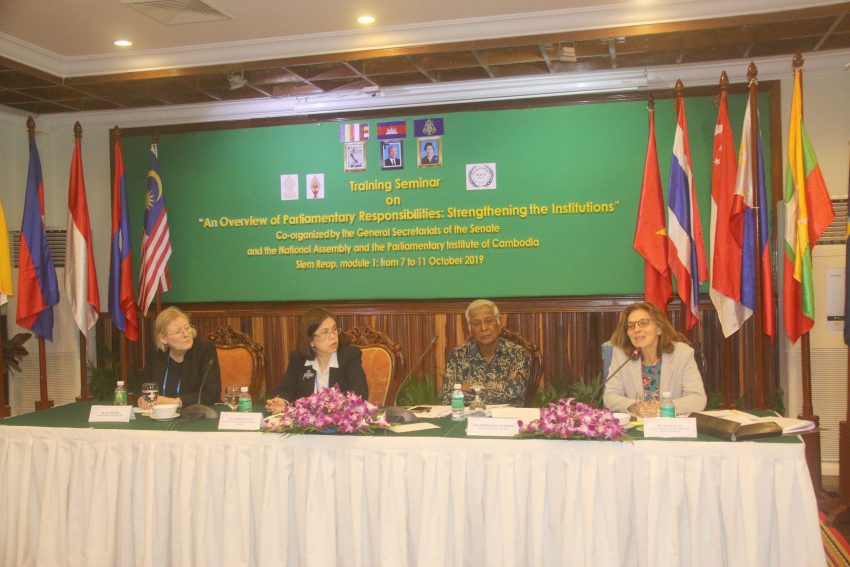The third day of the Training Seminar entitled “An Overview of Parliamentary Responsibilities: Strengthening the Institutions” organized by the Parliamentary Institute of Cambodia in collaboration with the Cambodian Parliament took place on the 9th of October 2019 in Siem Reap.
The 42 participants coming from nine ASEAN Inter-Parliamentary Assembly (AIPA) member Parliaments (Brunei, Cambodia, Indonesia, Laos, Malaysia, Myanmar, the Philippines, Thailand and Viet Nam) had the occasion to examine into the topic of the Representation Function of parliaments.
The objectives of the morning session were to: (1) Familiarize ASEAN participants with the practice of parliamentary communication in the United Kingdom and France and provide information on how PIC could technically support the representation function of parliaments in form of parliamentary communication training; (2) give an overview of how Parliament could fully engage with citizens and represent their voices and interests? What are the tools and mechanism provided by laws and regulations that allow parliamentarians to implement this function? (3) and to give an overview of ways to provide citizens with direct access to the decision-making process? (e.g. What are the existing tools, mechanisms and activities to support parliamentary outreach/communication? What are services, skills, challenges and needs to support this function?)
During this session Dr. Jan Taylor, Communications Specialist of PIC, gave two presentations on the engagement between Parliament and the citizens drawn on the experience of the United Kingdom, and on Parliamentary Communication and Public consultation guidelines. On her side, Ms. Sylvie Boulle, Advisor of the European Affairs Committee of the French Parliament, developed the case of the French National Assembly.
Following the presentations, the participants were encouraged to work in groups to discuss and share their experience on the practices of Parliaments in ASEAN countries for promoting the representation function.
For the afternoon session, the objectives were to provide an overview of: (1) The legal framework, tools, mechanisms, practices and challenges of implementing and supporting the Oversight Function of various parliaments; (2) how Parliament could ensure that governments implement policies and regulations in accordance with the law and the budget passed by the Parliament? (3) and what are the tools and mechanisms to support the implementation of parliamentary oversight? What are the activities carried out by the Parliaments when implementing parliamentary oversight? What are the difficulties and the needs of parliamentary staff to enable them to better support this function?
For this part of the Training Seminar, Ms. Sylvie Boulle illustrated the case of the oversight function and practices of the French National Assembly, while Ms. Susan VIETS, Manager of the Legislative Research Service of the Legislative Assembly of Ontario, Canada, described the features of the Canadian example. Mr. Xavier Nuttin of the European Institute of Asian Studies informed the audience about the structures and practices put in place at the level of the European Parliament.
To complete the overview, Dr. Sryneath Chhuor of PIC gave details on the Institute’s Fiscal Analysis Capacity Training (FACT) experience.

